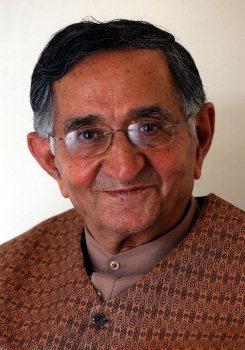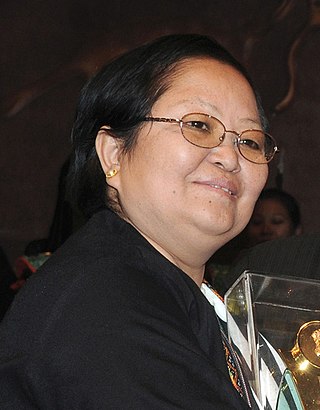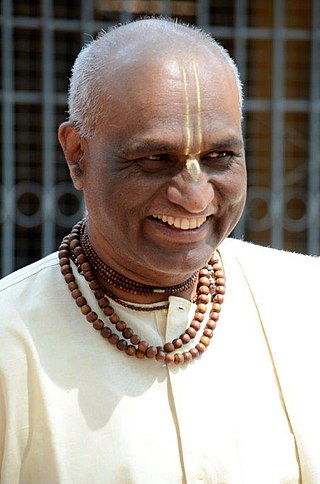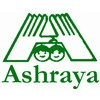Infosys Foundation is a non-profit organisation based in Karnataka, India, established in 1996 by Infosys to support the underprivileged sections of society. It supports programs in the areas of education, rural development, healthcare, arts and culture, and destitute care in remote regions of India. The foundation is solely funded by Infosys, and no external donations are accepted.

Jagan Nath Kaul was the founder, president, and patron of SOS Children's Village of India. SOS CVI provides a home to almost 15,000 children in 34 children's villages, located in various parts of the country. In addition to the children's villages, SOS provides indirect care to children through its 122 allied projects such as kindergartens, schools and social, medical and vocational training centres throughout India. SOS CVI provides direct and indirect care to almost 200,000 (200,000) children in the country.
Vidyaben Shah was an Indian social worker and activist known for her work with children, women and the elderly in India. While she was already serving as Vice-President, she was appointed the first non-officio President of the New Delhi Municipal Council (NDMC) by Prime Minister Indira Gandhi in 1975. She has held several leading positions in the field of social welfare since the 1940s. Vidyaben Shah died at the age of 97 on 19 June 2020 at her residence in Delhi, her son Mihir Shah confirmed the news of Vidyaben Shah death.
Manju Bharat Ram was an Indian educationist, who was the founder, chairperson of the managing committee and member of the board of trustees of The Shri Ram Schools, New Delhi; ranked as India's No. 1 day school by Education World’s Schools survey in 2008, 2009 and 2011.

Shobhana Ranade was an Indian social worker and Gandhian, known for her services towards her cause of destitute women and children. The Government of India honoured her in 2011, with the Padma Bhushan—the third highest civilian award—for her services to the society.
Jawaharlal R. Gangaramani, is an Indian businessperson and the Partner of Al Fara'a Group which has presence in the UAE, Saudi Arabia & Oman. In 2010, the Government of India awarded him with the Padma Shri, India's fourth highest civilian award, for his services to the field of social work.
Nomita Chandy was an Indian social worker from Bangalore, known for her services towards the rehabilitation of destitute children.
Anita Reddy is an Indian social worker from Karnataka and the founder of Association for Voluntary Action and Services (AVAS), known for her services for the rehabilitation and upliftment of the slum dwellers in Karnataka and Andhra Pradesh. She is the managing trustee of DWARAKA and DRIK Foundations, working for children's education and women's livelihoods. The Government of India honored Anita Reddy in 2011, with the fourth highest civilian award of Padma Shri.

Kanubhai Hasmukhbhai Tailor is an Indian social worker who is physically disabled. He is from Gujarat and the founder of the non governmental organization, Disable Welfare Trust of India, working towards the upliftment of physically disabled people. The Government of India honoured Tailor in 2011, with the fourth highest civilian award of Padma Shri.
Shamshad Begum is an Indian social worker, known for her efforts towards the education of backward communities of Chhattisgarh such as the Scheduled Caste, Scheduled Tribe and other backward communities. She was honoured by the Government of India, in 2012, with the fourth highest Indian civilian award of Padma Shri.
Gutta Muniratnam was an Indian social worker, a member of the National Planning Commission of India and the founder of Rashtriya Seva Samithi (RASS), a non governmental organization engaged in the social welfare activities in over 2500 socio-economically backward villages in the Rayalaseema region, spread across the present day states of Andhra Pradesh and Telangana. He was honored by the Government of India, in 2012, with the fourth highest Indian civilian award of Padma Shri.

Binny Yanga was an Indian social worker, a member of the National Planning Commission of India and the founder of Oju Welfare Association (OWA), a non governmental organization based in Arunachal Pradesh, working for the welfare of the weaker sections of the society and campaigning against social Illnesses such as child marriage, forced marriage and dowry. She was honored by the Government of India, in 2012, with the fourth highest Indian civilian award of Padma Shri.
Prema Purao is an Indian social worker, freedom fighter and the founder of Annapurna Mahila Mandal, a non governmental organization working for the empowerment of destitute women and children. She was involved in the Goa liberation movement and founded Annapurna Mahila Mandal in 1975. A recipient of the AIWEFA Stree Ratna Award, Purao was honored by the Government of India, in 2002, with the fourth highest Indian civilian award of Padma Shri
Shalini Moghe was an Indian educationist, social worker and the founder of Kasturba Kanya School for tribal children and Bal Niketan Sangh, the first Montessori school in the state of Madhya Pradesh. She was the chairperson of the Bharatiya Grameen Mahila Sangh, Indore, a national level non governmental organization working for the welfare and education of the disabled, orphans, under privileged and the economically weaker sections of the society and was involved with other Indore-based educational institutions such as Prestige Public School and Pragya Girls School. A winner of the Jamnalal Bajaj Award in 1992, she was honoured by the Government of India in 1968, with the award of Padma Shri, the fourth highest Indian civilian award for her contributions to the society.
Savita Behen (1919-2009) was an Indian politician, social worker, educationist and a former member of Rajya Sabha, the upper house of the bicameral Indian Parliament. She was known to be an advocate of women empowerment and gender equality and was listed among the 3300 distinguished living women of the world by the Council for Parity Democracy in 1990. She was honoured by the Government of India in 1971 with Padma Shri, the fourth highest Indian civilian award.

Madhu Pandit Dasa is a spiritual leader, the President of ISKCON Bangalore. As a humanitarian, he has been actively involved in programs like Akshaya Patra that provides mid-day meals to children studying in Government schools. He is the Founder and Chairman of The Akshaya Patra Foundation, guiding the organisation to realise the vision - "No child in India shall be deprived of education because of hunger”. The Government of India has conferred upon him the prestigious Padma Shri Award in recognition of the distinguished service rendered by Akshaya Patra Foundation for the children of India. He is also the Chairman of Vrindavan Chandrodaya Mandir, the upcoming iconic cultural and heritage complex in Vrindavan.
Mary Braganza, RCSJ, popularly known as Karuna Mary, was an Indian Catholic religious sister of the Society of the Sacred Heart, and former principal of Sophia College, Mumbai. Sr. Karuna Mary formerly led 204 colleges managed by the Society of the Sacred Heart. During her tenure at Sophia College, in 1970, the institution started Sophia Polytechnic. In 2008 the Government of India awarded her the fourth highest civilian honour, the Padma Shri for her social contributions.

Madeleine Herman de Blic was a Belgian-born Indian social worker and humanist, known for her humanitarian services in the south Indian state of Puducherry. She is the founder of Volontariat, a Puducherry-based non governmental organization engaged in social welfare activities since 1966. She is a recipient of several honors such as Legion of Honour from the Government of France, Order of the Crown from the King of Belgium, Doctor Schweitzer Award and the Independence Day Award from the Government of Puducherry. The Government of India awarded her the fourth highest civilian honour of the Padma Shri, in 2016, for her contributions to society.

Sulagitti Narasamma was an Indian midwife from Pavagada town, in Tumkur district of Karnataka state. She performed more than 20,000 traditional deliveries free of charge over a 70-year period of service in deprived regions of Karnataka with no medical facilities. Her work was honored with the National Citizen's award of India in 2012 and the country's fourth highest civilian award, the Padma Shri, in 2018.
Lata Desai is a medical doctor from the Indian State of Gujarat who is 1980 along with her husband Dr. Anil Desai and a few friends founded the Society for Education Welfare and Action - Rural, a voluntary organization devoted to health and development activities in the tribal area of South Gujarat.







